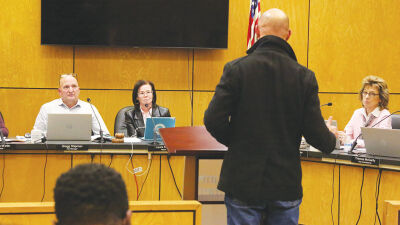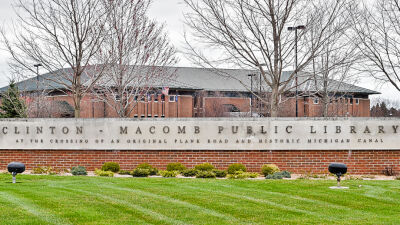
State Rep. Denise Mentzer, D-Mount Clemens, representing the 61st Michigan House District, who is also a former Mount Clemens city commissioner, speaks against a proposed statewide water affordability program at a town hall in Mount Clemens on Feb. 8.
Photo by Dean Vaglia
MOUNT CLEMENS — As a series of bills that could make water more affordable for Michiganders works its ways though the halls of Lansing, supporters and detractors are taking their cases to the people.
In Mount Clemens on the evening of Feb. 8, a town hall was convened at the Mount Clemens Public Library to discuss the bills that would create a statewide water affordability fund and program, as well as the effects the bills could have on the city’s people. While the Mount Clemens City Commission unanimously passed a resolution against the bills on Jan. 3 at the urging of Macomb County Public Works Commissioner Candice Miller, it was City Commissioner Spencer Calhoun who arranged the meeting.
“At the time (of the vote), I thought we had all of the information,” Calhoun said to open the town hall. “As I talked to other folks, I learned there’s a lot to this legislation. It’s a much bigger picture, something that affects many people … and so I thought it would be appropriate to get people in the room who know a lot more about this to talk about it, share with the community, hear some feedback and ask any questions that we have.”
Calhoun went on to moderate the meeting, introducing five supporters of the bills who walked through them and how they would affect residents.
The bills (SB 25, 549-554 and HB 5088-5093) would establish a statewide affordability program through the Michigan Department of Health and Human Services so low-income Michiganders would only pay up to 3% of household income on water bills. The program would be open to residents earning up to 200% of the federal poverty level, divided into two tiers split at 135% of the federal poverty level. The program would be funded by a $2 monthly charge on all real water customers in the state, which could be increased to $3, and existing programs could continue with the amount paid into them subtracted from the state-level fee. Protections against water shut-offs would be included and reconnecting to water systems would be reduced from a felony to a civil infraction with community services, with fines added on for repeat violations and felonies applied if metering or backflow devices are damaged.
The bills ultimately aim to enshrine water as a human right into Michigan law.
“What it (SB 25) says is this state would be one of the first states leading on this issue,” said Alice Jennings, an attorney specializing in human rights. “(Michigan) would have the ability to say every single agency in the state government should have a plan on how they are going to (ensure) water as a human right.”
While some speakers discussed the history of the bill, how it would affect Michiganders and how it has changed through negotiations, Christy McGillivray of the Sierra Club used her time to blame underfunded infrastructure as the primary cause of high water costs in Michigan.
“We funded the buildout of our drinking and wastewater infrastructure in the middle of the 20th century with federal dollars,” McGillivray said. “That was a massive investment to build a truly core staple of our infrastructure. … We stopped funding it. Almost all of the funding now for our drinking and wastewater systems comes from individual ratepayers.”
McGillivray argued the program would serve as the first step in a larger plan to overhaul water infrastructure funding by lowering the cost of water.
“We’re going to wind up paying for this anyway,” McGillivray said. “Either we take this kind of giant step forward to pay a little bit to lower costs for everyone, or we are all going to be paying more. That debt isn’t going away and instead of paying for infrastructure and making sure we’re getting input to the system from everyone, all of our bills are going to go up because we’re going to be paying for bad debt.”
Once the speakers finished their remarks, the town hall took on a more participatory tone. On one side there were officials from Mount Clemens who had doubts about how effective the bills would be for city residents.
“(In) systems like ours, most residents are not going to hit the usage requirements to be able to leverage this program,” said City Commissioner Erik Rick. “I am concerned that this is just subsidizing very expensive infrastructure areas with the greatest need and calling it an affordability program. … No matter where the (requirement) cutoffs are there’s going to be folks getting the short end of the stick, but right now Mount Clemens is already in a really rough spot.”
Rick’s concern was that residents would use enough water to qualify for the program while paying higher rates once the city joins the Great Lakes Water Authority. He asked that the bills target “the first gallons people are using instead of the last,” focused on subsiding water use for people in need up to a certain point.
State Rep. Denise Mentzer, D-Mount Clemens, a former city commissioner currently representing the 61st Michigan House District, provided the most vocally passionate arguments against the bills among attendees. Mentzer said she would not support the program unless communities were allowed to opt out of funding the program, funds raised by the program remain local to where they were raised and high-volume water users pay a fee higher than the $2 or $3 a month.
Audience members were more supportive of the bills. A number of those who spoke were receptive to the system as a way to provide access to safe water to all Michiganders.
“If it’s happening to one person, that’s too many,” said Joel Rutherford, a Warren resident and the current chair of Michigan’s 10th Democratic Congressional District. “The idea is that when you get to a point, water is a right. Nobody should have to go without water.”
Another audience member, Clair Drake, took issue with opponents of the bills framing the fee of $2 or $3 as a tax and the program as welfare.
“This is basically insurance,” Drake said. “It’s like your car insurance. … Hopefully you don’t have to use it that much, but if you do need to use it, you want to have the insurance. This is an insurance policy for our community, it’s for our state, because state problems are city problems. If we as a state have a problem with people not being able to shower every day, not being able to drink water safely from home … that’s a city problem.”
Mount Clemens City Manager Gregg Shipman spoke about some of the city’s programs to assist residents who have trouble paying their water bills. The city has shifted to monthly billing to allow residents to better track their water expenses, while radio-equipped meters can be checked using a phone app. If a residence has a leak, the city will waive the sewer bills for the leak duration. The city will work with residents on payment plans to ensure bills are paid at the cost of waived fees.
 Publication select ▼
Publication select ▼


























